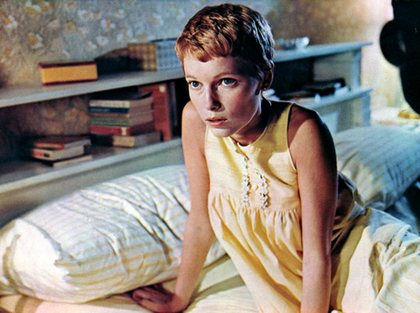BY JOANNA C. VALENTE
Recently, I had the privilege of reading Samantha Duncan's chapbook The Birth Creatures (Agape Editions, 2016). The chapbook is scary, poignant, and honest--it centers around a pregnant woman who is only three weeks away from giving birth. In this way, it focuses on what birth actually means, and the frightening and surreal parts of pregnancy that many women often aren't sure how to vocalize--or are too afraid to vocalize. I love how brave Duncan is by focusing on what our society cannot--that pregnancy is not always pretty and happy--and in many ways, it's a violation of a woman's body, regardless of how loving and beautiful it also is.
Like everything else, pregnancy has contradictions and dualities, and Duncan perfectly illustrates this in many of her lines. I was lucky enough to interview her about her collection and why she wrote it:
JV: The poems are clearly about the strangeness of pregnancy, which I absolutely love, because not enough poetry deals with the absurdity and downright creepiness of pregnant bodies. How did you begin to write these poems? They must have been difficult to write in an honest way.
SD: It can be difficult, because it goes against the narrative of pregnancy, childbirth, and motherhood as endlessly joyous experiences that make you glow with love and selflessness. And, you tend to get shamed by others if you don’t fit that narrative. My first postpartum experience was rough, mostly due to a doctor’s neglect and mistreatment, so I was miserable and exhausted and angry for a few months. But any time I voiced my concerns, I was shut down by people insisting that since the baby was healthy and, well, I should be nothing but happy.
My struggles were made irrelevant by the fact that I had a tiny human to raise. This book is somewhat of an answer to that ridiculous notion--I want to write selfishly and unapologetically about the rocky transitions we make, in hopes that they can be more understood and accepted. So much about pregnancy and babies is weird and creepy, how can you not write about that aspect of it?!
Who is the speaker actually speaking to? At times, the speaker seems to be talking to the unborn child, and then themselves. What is the speaker trying to say?
This goes along with the awkwardness in transitioning from non-parent to parent. How does one talk to a child, both when it’s in the womb and after it’s born? How does one address oneself, who now appears unrecognizable? I meant to have that back-and-forth, because when you’re talking to a baby (who doesn’t understand you), you’re in a way talking to yourself and an extension of yourself and a new version of yourself.
What were you listening to and reading and watching while writing this?
There’s a deliciously bizarre children’s book called Alphabeasts by Wallace Edwards that I drew from while writing this. It’s a trippy journey through the alphabet told through rhymes about various creatures that live in a big, old house, and there’s a subtle suggestion the house itself might be alive. There’s a lot of life and movement in The Birth Creatures--animals, growth on and around the house, and parts of the narrator’s own body--to juxtapose the narrator’s sense of lifelessness.
Punctuation & structure are clearly crucial parts of your poems--the visual aesthetic creates so much silence, it’s almost deafening. Why did you indent many of your lines?
I wanted the appearance of the poems to match the narrator’s conflicting feelings and uncertain identity. Accomplishment stifled by guilt and frustration, happiness stifled by exhaustion and illness, confidence stifled by confusion, and so on. It made sense to give the lines different indents. In the haze of giving birth and recovering, it’s hard to remember who you were then and learn who you are now. The "structure" of yourself and your life is turned on its head. And so, while I drafted it with punctuation, the marks slowly disappeared through each edit.
What part of you writes your poems? What are your obsessions?
My poems come from whatever I’m feeling intense about at any given moment, which can vary in degrees of seriousness. For instance, I love nineties pop culture, but I also like to explore feminism and race and gender roles. I’m pretty snarky, so I’ll access serious subjects and experiences through odd or humorous filters, like the magical realism elements in The Birth Creatures.
I also get inspiration from nonfiction I read, which is all over the map--current events, archaeology, astronomy, social and culture issues…I’ve been reading about death and burial rituals and getting some poem ideas. As much as I write poetry about my own experiences, I’m constantly learning and writing about the world, as well.
Samantha Duncan is the author of the poetry chapbook Moon Law (Wild Age Press, 2012), and her work has appeared in several journals, including The Bakery, Vector Magazine, and Cricket Online Review. She lives in Houston.
Joanna C. Valente is a human who lives in Brooklyn, New York. She is the author of Sirs & Madams (Aldrich Press, 2014), The Gods Are Dead (Deadly Chaps Press, 2015), Marys of the Sea (forthcoming 2016, ELJ Publications) & Xenos (forthcoming 2017, Agape Editions). She received her MFA in writing at Sarah Lawrence College. She is also the founder of Yes, Poetry, as well as the chief editor for Luna Luna Magazine. Some of her writing has appeared in Prelude, The Atlas Review, The Feminist Wire, The Huffington Post, Columbia Journal, and elsewhere. She has lead workshops at Brooklyn Poets.































